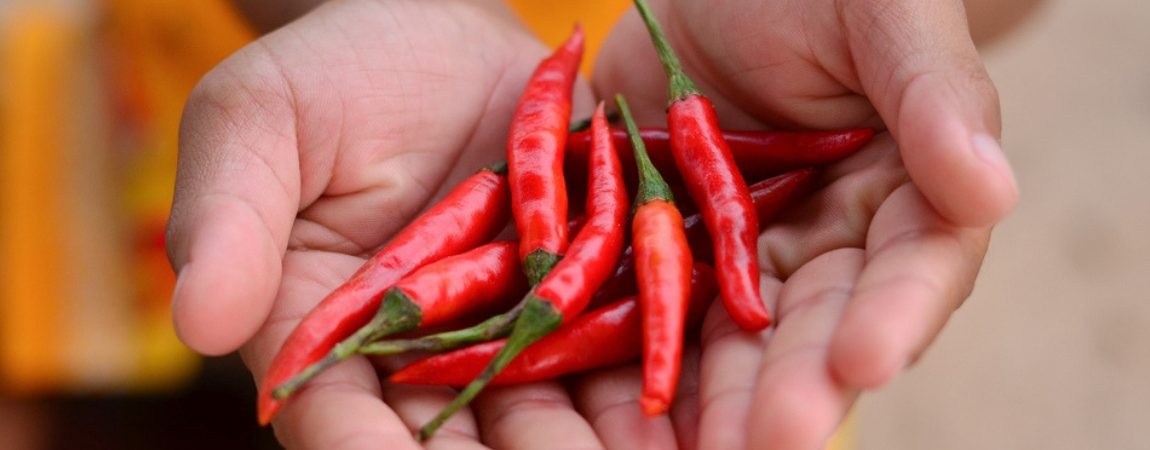Chili Pepper Compound Capsaicin Reduces Mortality Risk, Says New Study
People all over the world love spicy foods -- and chili peppers in particular -- but these potent peppers may do more than just add flavor to our favorite meals. According to a recent study conducted at Italy's Mediterranean Neurological Institute, eating chili peppers may benefit longevity. In particular, the researchers found that capsaicin reduces mortality risk by positively affecting cardiovascular health and metabolic rates in adults.
New Research Finds Capsaicin Reduces Mortality Risk
 In conducting their research, the team studied surveys from subjects in the United States and China, ultimately noting that those who ate more chili peppers exhibited reduced early mortality rates. Taking their research a step further in a separate study, the team then observed the ways in which capsaicin affected lipids in the blood in an attempt to uncover exactly how the compound improved mortality.
In conducting their research, the team studied surveys from subjects in the United States and China, ultimately noting that those who ate more chili peppers exhibited reduced early mortality rates. Taking their research a step further in a separate study, the team then observed the ways in which capsaicin affected lipids in the blood in an attempt to uncover exactly how the compound improved mortality.
In this second study, they included 22,811 adults, aged 35 or older. The subjects were observed for a period of 8.2 years on average. For each participant, supplemental factors that could affect the outcome of the study, such as activity levels, smoking, alcohol consumption and medical history, were accounted for in advance. The subjects were asked to complete questionnaires about their eating habits, which included questions about their consumption of chili peppers.
After reviewing the answers to the questionnaires, the research team found that 24.3 percent of the subjects admitted to heavy consumption of chili peppers. In the terms of the study, this meant they consumed chili peppers at least four times per week. Additionally, 33.7 percent of the group reported that they consumed chili peppers rarely, or not at all. The researchers found that those participants with the heaviest chili pepper consumption had a 23 percent lower risk of early mortality from all causes when compared to those who rarely or never ate chili peppers.
The Effects of Capsaicin on Cardiovascular Health
Looking specifically at how chili peppers affected cardiovascular health, the researchers found that there was a 34 percent lower risk of death by cardiovascular events as a result of heavy chili pepper consumption. In particular, the risks of early mortality resulting from cerebrovascular incidents and ischemic heart disease were dramatically lowered.
The team was surprised to discover that the type of diet had little to no impact on mortality in the study. Whether the test subjects ate a Mediterranean or a typical Western diet, the benefits from eating chili peppers was not affected. Although these factors had no impact on the results of the study, the research team also noted that highly educated, older males tended to eat the most chili peppers. Those who ate more chili peppers also more commonly suffered from type 2 diabetes, high blood pressure, obesity, and higher blood lipids. For this reason, the scientists conducting the study concluded that the process by which chili peppers reduces mortality does not affect other cardiovascular disease risk factors.
The researchers noted that this study could not establish a causal relationship, so further research is needed. In the meantime, there's enough evidence to suggest that the capsaicin in chili peppers can help improve longevity. Since eating more chili peppers isn't appealing to some people, an alternative is to take a daily supplement that contains capsaicin. Taking a daily supplement can help you enjoy the benefits mentioned here without actually having to consume more chili peppers each week.
Other Capsaicin Health Benefits
 Besides findgins that capsaicin reduces mortality risk, previous research has found that capsaicin is also beneficial in alleviating chronic pain, such as that caused by arthritis. When the compound is formulated into a topical lotion or cream, it affects how pain signals are transmitted from the nerve endings to the brain. As a result, pain sensations are reduced or eliminated altogether. It has been found effective in treating the pain caused by rheumatoid arthritis, osteoarthritis and fibromyalgia.
Besides findgins that capsaicin reduces mortality risk, previous research has found that capsaicin is also beneficial in alleviating chronic pain, such as that caused by arthritis. When the compound is formulated into a topical lotion or cream, it affects how pain signals are transmitted from the nerve endings to the brain. As a result, pain sensations are reduced or eliminated altogether. It has been found effective in treating the pain caused by rheumatoid arthritis, osteoarthritis and fibromyalgia.
Topical capsaicin treatments are generally safe, but people with sensitive skin may want to use the product with caution. In some cases, it can cause skin irritation at the application site, including rashes, burning sensations and redness. Itching and swelling may also occur in some instances. Even if these symptoms are experienced, they often disappear after a short time of continued use. They rarely reappear, except in cases of extreme temperature changes, or when the skin is exposed to extremely hot or cold water.
In another previous study, conducted at Marshall University's Joan C. Edwards School of Medicine, it was found that capsaicin may help prevent cancer from metastasizing, or spreading to other parts of the body. The research involved adapting capsaicin into medicinal compounds that didn't produce the same adverse side effects as those caused by chili pepper consumption.
Of the three products tested (capsaicin, capsiate and capsiconiate), only capsiconiate had no effect on test mice. Capsiate was found to prevent cancer cells from invading nearby cells, which is the first step in a process that leads to metastasis. They also found that mice who were treated with capcaisin had less metastatic cells than those who did not receive any capsaicin-related product. The researchers hope that future studies will lead to a natural capsaicin treatment for lung cancer that could help prevent the spread of the disease without subjecting the patient to adverse side effects.





